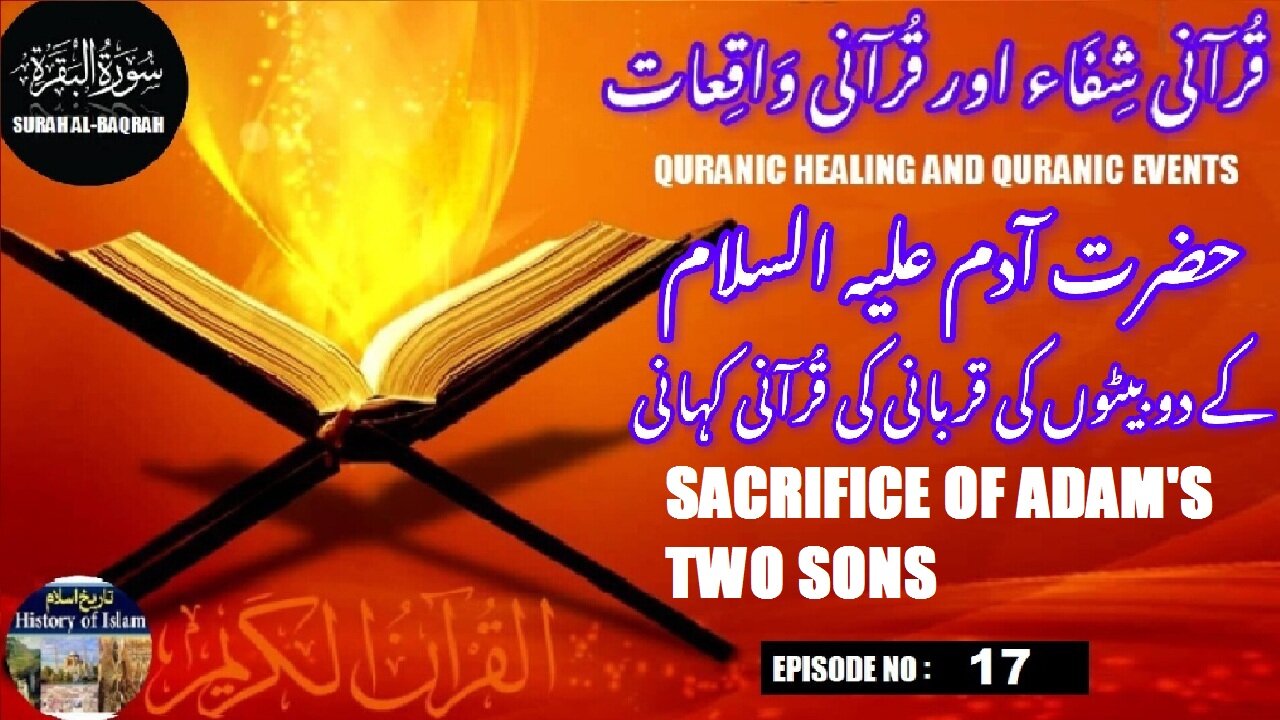Premium Only Content

The Quranic story of the sacrifice of Adam's two sons آدم کے دو بیٹوں کی قربانی کی قرآنی کہانی
@islamichistory813 #quranic #story #sacrifice #two #sons #adam #stories #quran #adamandeve #prophetadam, #quranicstories #storyofadamssons, quran stories, the story of prophet adam | #deenee #islam #animation #story #animation #stories #prophet #english #urdu #quran #stories #prophets #action story #children #ibrahim #kids #bible #iqra #cartoon #prophet #adam #islamic #stories
The Quranic story of Sacrifice of the Two Sons of Adam.
Brothers, sisters, friends and elders, Assalamu Alaikum Wa Rahmatullahi Wa Barakatuh.
We welcome you to the informative series episode No 17 on healing and events from the Holly Quran, in this video we will describe,The Quranic story of Sacrifice of the Two Sons of Adam
The story of the two sons of Adam, Qabil (Cain) and Habil (Abel), is one of the earliest accounts of human conflict and moral struggle recorded in history. It is narrated in the Qur’an in verses 27–31 of Surah Al-Ma’idah. This profound event highlights themes of faith, jealousy, righteousness, and the consequences of unchecked envy. The story serves as a timeless lesson on the importance of sincerity in worship, submission to divine will, and the dangers of allowing negative emotions to dictate one’s actions.
Adam (AS), the first human and prophet, was blessed with two sons, Qabil and Habil. As they grew, they were instructed to offer sacrifices to Allah. Habil was a righteous and God-fearing man who tended livestock, while Qabil was a farmer who worked the land. When they were commanded to make an offering to Allah, Habil sincerely presented the best of his flock, choosing the healthiest animal as his sacrifice. Qabil, on the other hand, selected some crops from his harvest but, unlike his brother, did not offer the best of his produce. His sacrifice was given with reluctance and insincerity, lacking the humility and devotion required in worship.
Allah, who knows the innermost intentions of all beings, accepted Habil’s offering while rejecting Qabil’s. The Qur’an states: “And recite to them the story of Adam’s two sons in truth, when they both made an offering, and it was accepted from one of them but was not accepted from the other. Said the latter, ‘I will surely kill you.’ Said the former, ‘Indeed, Allah only accepts from the righteous.’” (Surah Al-Ma’idah 5:27). This rejection ignited a fire of jealousy and rage in Qabil’s heart. Rather than reflecting on his shortcomings and seeking Allah’s guidance, he allowed envy to consume him. He felt humiliated and resentful that his younger brother’s offering was accepted while his was not. Instead of correcting his intentions and improving his deeds, he let anger fester until it led to a tragic decision.
Overcome with jealousy, Qabil threatened to kill Habil. However, Habil remained steadfast in his faith and replied with wisdom and patience. He reminded Qabil that Allah accepts sacrifices only from those who are sincere and pious. He also assured Qabil that he would not retaliate even if he attempted to kill him, for he feared Allah and sought His pleasure rather than engaging in violence. Habil’s words reflected his deep understanding of righteousness and submission to Allah’s will.
Despite his brother’s efforts to dissuade him, Qabil’s jealousy turned into blind hatred. He eventually carried out his terrible threat and murdered his innocent brother. This act of violence became the first recorded murder in human history, marking the beginning of bloodshed among humankind. After committing the crime, Qabil was overcome with guilt and confusion. He did not know what to do with his brother’s lifeless body. In His mercy, Allah sent a sign to teach him a lesson. The Qur’an narrates: “Then Allah sent a crow scratching in the ground to show him how to hide the disgrace of his brother. He said, ‘O woe to me! Have I failed to be like this crow and hide the disgrace of my brother?’ And he became of the regretful.” (Surah Al-Ma’idah 5:31).
Qabil saw a crow digging into the earth to bury another dead crow. Through this divine lesson, he realized his ignorance and shamefully buried his brother’s body. However, his regret did not absolve him of his sin. He had committed an unforgivable crime out of arrogance and jealousy, and his actions set a precedent for injustice in human society.
The story of Qabil and Habil teaches profound moral lessons. It emphasizes the importance of sincerity in worship and obedience to Allah. Habil’s righteousness and humility contrasted with Qabil’s arrogance and resentment, illustrating the consequences of failing to control one’s desires. It also serves as a warning against the destructive power of jealousy, which can lead people to commit grave sins if left unchecked.
Moreover, this story highlights the gravity of murder and the sanctity of human life. Allah decreed that taking an innocent life is one of the greatest sins, and the Qur’an later states: “Whoever kills a soul unless for a soul or for corruption [done] in the land – it is as if he had slain mankind entirely. And whoever saves one – it is as if he had saved mankind entirely.” (Surah Al-Ma’idah 5:32). This verse underscores the responsibility of humans to uphold justice and protect life rather than give in to destructive emotions.
So friends, the story of Qabil and Habil is not just a historical account but a moral guide for all generations. It teaches the values of sincerity, humility, and patience while warning against envy and violence. It reminds believers to constantly purify their intentions, seek Allah’s guidance, and control their emotions. Through this narrative, Allah provides a timeless lesson on faith, righteousness, and the importance of making moral choices based on divine principles rather than worldly desires.
With this, we seek your permission until tomorrow and pray to Allah Almighty to grant us the ability to follow the injunctions of the Quran and the Prophetic Hadith, Amen
Allah Hafiz.
==========================
-
 5:32
5:32
ISLAMIC HISTORY
5 hours agoMoroocon Islamic Scholar Fatema Mernissi مراکش کی اسلامی اسکالر فاطمہ مرنیسی
-
 LIVE
LIVE
The HotSeat
1 hour agoTrump Drops Hammer: Burn the Flag = 1 Year Prison! Army Deployment Next?!
776 watching -
 LIVE
LIVE
Jamie Kennedy
19 hours agoThe Truth About Anger, Race, & Feminine Energy w/ Jesse Lee Peterson | Ep 219 HTBITY
203 watching -
 1:45:39
1:45:39
The Quartering
6 hours agoMMA Fighter Tries To K*LL Wrestler, Hollywood PANIC & Sam Tripoli's Favorite Conspiracies
133K150 -
 1:05:04
1:05:04
Mark Kaye
5 hours ago🔴 Trump Sends Dems Into RAGE Over Flag Burning Executive Order
13.5K18 -
 LIVE
LIVE
Film Threat
18 hours agoVERSUS: AUGUST BOX OFFICE BLOOD BATH! MARVEL IS COOKED! | Film Threat Versus
98 watching -
![[Ep 734] Leftists Support of Black-on-Black Crime | Bolton Raid / Media Hypocrisy](https://1a-1791.com/video/fww1/0e/s8/1/a/F/p/c/aFpcz.0kob-small-Ep-734-Leftists-Support-of-.jpg) LIVE
LIVE
The Nunn Report - w/ Dan Nunn
1 hour ago[Ep 734] Leftists Support of Black-on-Black Crime | Bolton Raid / Media Hypocrisy
195 watching -
 29:39
29:39
Afshin Rattansi's Going Underground
1 day agoEx-Israeli PM Ehud Olmert: INTOLERABLE Amount of Innocent Palestinians Have Been Killed in Gaza
10K26 -
 7:49
7:49
Dr. Nick Zyrowski
6 months agoVitamin D is Dangerous? Get The TRUTH!
10.4K11 -
 1:03:48
1:03:48
daniellesmithab
3 hours agoExploring Nuclear Energy in Alberta
15.2K5